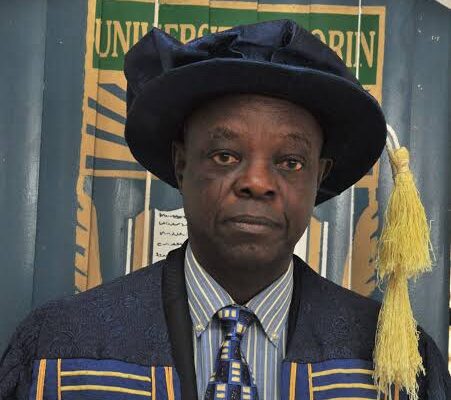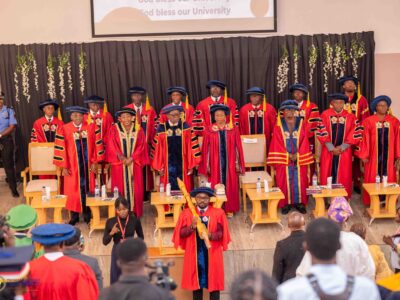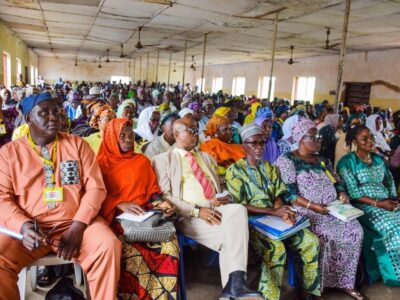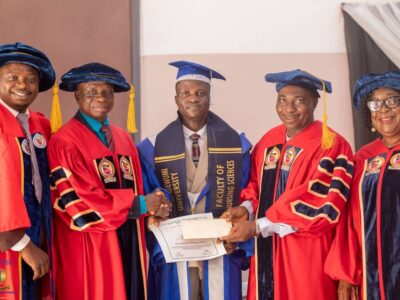Sulyman Age Abdulkareem, a professor of Chemical Engineering, is the Vice-Chancellor of the University of Ilorin. He graduated from University of Detroit in the US in 1980 with BChE degree and MChE degree in 1988. He was awarded a PhD by the University of Louisville in the US. He joined Unilorin in 1999 and became the vice-chancellor in 2017 after Professor AbdulGaniyu Ambali’s tenure. In this interview, Abdulkareem sheds lights on issues bordering on the management of the university in the last three years, the return of the university to the mainstream Academic Staff Union of Universities (ASUU) as well as the ongoing ASUU strike.
How have you fared in the last three years of running the university as the vice-chancellor?
It has been very challenging. But gracefully, I have been able to do things to what I call the satisfaction of God most of the time.
What are the challenges?
It’s been challenging because you have to deal with welfare and people’s concerns. Sometimes, people would even bring their matrimonial problems to you, apart from academic and other related management things that you have to do for the university. You have to get personal sometime to be sure that if somebody falls sick, they would expect you to go and visit the family. These are not related issues, but they are part of the job that comes with the terrain.
In terms of the challenges relating to the running of the university given the huge capital involved, how have you been able to cope?
In the first year, things were somehow rough because we were on Government Integrated Financial and Management Information System (GIFMIS) and whatever was given to you as a university to run it, you had to make sure it went round and there were a lot of things that were paid out of IGR that was making things very difficult in the first year. But since the IPPPIS came up, things have levelled up to the point that you know how much IGR you have when students resume and you must be able to manage it to make sure that it lasts the whole session and that is what we were doing.
When you came on board, one of the things you did was to ensure return of the local chapter of the ASUU to the national body after almost two decades of severing relationship with the union. Are you not worried that the return has altered the uninterrupted academic calendar that the union has been known for?
Let me set the record straight. We did not pull out of ASUU. We were suspended. When they came and said they were ready to lift the suspension, I as VC can’t say I don’t want you on my campus. ASUU suspended this university and throughout the 19 years, there must have been more than one dozen meetings all over Nigeria. From Ogbomosho to Oyo, Abeokuta, Ado Ekiti, several places. Each time they met, they were not able to reach a truce. But this time and God is my witness, four people came through that door from the national body and said they wanted to make peace with the local faction. I remember telling them, ‘you are not fighting the VC as far as I am concerned.’ The people you are fighting, if you can make peace with them, it is fine.
All that happened is nothing other than having two warring parties fighting each other. God used me for them to sit down and talk to each other.

If you ask me, is joining the right thing to do? Being forgiven or brought back to the union does not mean you have to go on strike. I know the union believes in some issues and I am a member by the way. But one thing I have never agreed to since I joined in 1996, coming from a totally trained American background, is that I don’t believe any lecturer should go on strike.
If you have grievances with those who are running the institution, you have a reason to raise issues. But it should not be to the detriment of the students. Again, I was lucky. From primary school up to PhD, I never missed one day in my life and it is because I had good teaching, good tutoring, good education and I can only give that credit to my teachers and lecturers.
So I never once believed and till now that you are talking to me, that the right thing to do is to go on strike.
If they keep telling me that, that is the only language the government understands, there must be a way to protect the students. There are some hard realities. The pay is poor. Facilities are not the best you can have in the country. This system is still able to produce extremely good students. We must do our best as lecturers to make sure that the little available is used in such a way to give the very best education to our students. That is what I will implore fellow ASUU members to do, but not to say that the government is meeting the needs of ASUU or the education as required.
Whatever is available, we must do our best to make sure that we do not fail our students on the contract between us them.
What would be your advice to ASUU and the Federal Government?
Each time we go on strike, it is bad for the lecturers and equally bad for the students. Continuity breeds something in you that you cannot equate to broken or abridged acquisition of knowledge. Continuity, sustenance of lectures, learning and continuous academy should guide us in the way we run our system. When you spend most part of the time sitting down at home, it is not good for any mind, whether students or lecturers. I am a scholar to the core. All my life, I am either in school or at work. So, making a mind go idle is a taboo to me even for one day. Your mind should progressively be looking for things to do or improve. It should not come to a point where you go home for six months and you worry about whether you are going to resume or not. That is not how to treat a good mind, you should develop it but not deprive it of the needed growth.
A lot of people believe the education standard and quality of graduates are waning. What are your thoughts?
I don’t agree with that statement and I have said it at several fora. The problem we have now is that there are too many distractions. We have mentioned the issue of strike and we have lecturers who are not dedicated to what they are doing as it used to be in the past. In between the insinuation of waning standard, we are still producing many extremely brilliant students. Being a teacher for so many years, I have met some students that have blown my mind by being extremely good by any measure I can use. When you get a degree, it does not mean you have it all. I remember being told in the US that if you have first class and you are the best brain, if they take you from your university to your workplace, the owner of that place must take time to develop you, because what you do at MIT is not what you are going to meet at GE (General Electric) or 3M where I have worked before. I worked for four years on a PhD on Reactor. When I got to my place of work, I saw a different thing and I had to deliver.
So when employers say people are coming out substandard, I don’t agree. No matter how good they are, you still take the time to develop them because the equipment you are using at work is not what they are using in the university. But I believe employers do not want to spend on the development of credible skilled men.
But the university is known to be very strict with students. Have your disciplinary measures against erring students toned down?
They have not been toned down. People are still being punished. But we are working more on counselling people than punishing them. But some of the punishments are terminal. If you expel somebody, that person must go and start all over somewhere. Is that not so? That is not good and second chances are not always there. My prayer is that these kids would realise that God has given them an opportunity they should not mess with or waste it.
How best do you think the university can respond to the issue of unemployment?
No university is supposed to take care of unemployment. We are supposed to work with the government and the industry as universities to make sure we create an avenue. Before I came in 1996 with a PhD degree in Chemical Engineering, I was self-employed. I started a business that was worth over N11bn a day for Nigeria. I started a pure water business and I was doing extremely well financially. But God wanted me here. Otherwise, I was satisfied with what I was doing. You cannot sit down and whine when God has given you the chance to go to university. You must ask yourself, what can I do with the degree I have? That is the beginning of entrepreneurship. What other things do I have within me that I can use to keep going and be an honourable person? I don’t have to beg anybody? What other thing can I do to earn a living? It may mean further training. Sometimes, it can be as easy as going back to your soft skill to make a person of you. I have said that if I learnt tailoring and earned a degree, I would do it differently than somebody who didn’t go to a university.










Comments